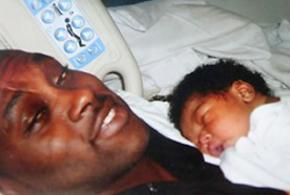Killed because they called for help
The family of Walwyn "Smiley" Jackson describes to the horror of watching as police killed the young man they were supposed to help.
ANOTHER YOUNG Black man was gunned down by New York City police in early September--one in a long list of people killed by those who were supposed to "protect and serve" them.
On September 7, 26-year-old Walwyn "Smiley" Jackson was shot by police in Queens. His family had called 911 when they found him holding a kitchen knife to his own throat. Jackson was distraught at being unemployed and unable to provide for his 2-week-old son, Landon.
As Jackson's grandmother, Gloria Cameron, said in an interview:
We called 911 because we wanted an ambulance to come to take him to the hospital. He was no threat or harm to anyone but himself. When [the police] came to the door, I didn't want to let them in. They told us to get out of the way and stay downstairs. One of them went for their gun as they went upstairs. I tried to tell them he's sick. I started to cry and then I heard the shot. He never even made a sound.
What little coverage there is in the mainstream media described Jackson simply as an "emotionally disturbed man," wielding a seven-inch knife. "That's what bothers me the most," said another family member. "He wasn't 'emotionally disturbed,' he was just depressed."

"We told him not to worry, we'd take care of him" Jackson's mother, Lorna Francis, said in an interview. "But my son, the way I brought him up, he didn't want to depend on anybody."
The family disputes media reports that the police attempted to Taser Jackson first. Many family members also don't believe Jackson was actually going to kill himself. In fact, he hesitated for several hours after first putting the knife to this throat, speaking to his mother and brother on the phone.
"There are no words to express how I feel," Francis said. "They took a good person, they took my life." "[The police] tell too many lies, and they think they can get away with it," she continued. "When you call for help, they take that as their prescription to kill."
According to Francis, no one from the NYPD, the city or any local politician has come to speak to her.
In fact, rather than apologize to the family, the NYPD continues to victimize them, including at the wake at the Jackson family home. According to Francis, the police parked a van down the street, harassed and searched people or their way inside, and even ticketed her 21-year-old son when he picked up a beer can someone had left on the ground outside.
Jackson's family has refused to be intimidated, holding vigils at the house and marches to the precinct to demand that the officer who shot Jackson be held accountable. "I want an indictment," said Francis.
JACKSON'S FAMILY joins a growing list of New Yorkers organizing week in and week out for justice for loved ones gunned down by the NYPD.
Weekly vigils in the Wakefield neighborhood of the Bronx helped put pressure on the district attorney to indict Richard Haste, the officer who murdered the unarmed 18-year-old Ramarley Graham in his home in February. Ongoing protests are demanding justice for Shantel Davis, a Brooklyn woman killed in June, and Reynaldo Cuervas, a Bronx bodega worker who was killed the same day as Jackson, shot while he fled a robbery at his store.
Activists and family members from around the city have been on hand to support and offer condolences to Jackson's family.
Franclot Graham, father of Ramarley, has repeatedly traveled from one end of the Bronx to the far end of Queens for vigils and was on hand at Jackson's funeral last Saturday. "This is not a fight I asked for," said Graham, "but one that was put upon me."
The Graham and Davis families are joining a citywide speaking tour in early October. "It's become a movement of families who have lost loved ones to police brutality and aggressive police tactics," said Graham. "We are beginning to act as one unit to slow down this assault."
With long-term unemployment reaching epidemic levels at the same time that both federal and city services are cut, tensions will continue to rise in all but the wealthiest zip codes in New York. The city's main response to those who crack under the pressure has been violence and intimidation.
Last spring, New York saw the beginning of a broad-based movement--including unions, community organizations and local politicians--to end the NYPD's racist stop-and-frisk policy. However, the problems of aggressive cops run wide and deep, and with most mainstream political figures focused on the elections at this time, it will be up to these families and their supporters to lead the struggle for justice for their loved ones.


